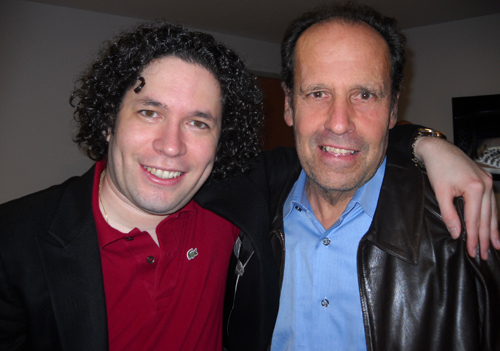The Maestro of Maestros: Gustavo Dudamel


A flick of the baton, a nod of the head, a pointed finger, a hand waving gracefully through the air, a humming along to the music, this is all in a day’s “work” for Gustavo Dudamel, conductor of the Los Angeles Philharmonic Orchestra, one of the world’s best. During a concert, he artfully conveys and displays the love he feels for music, as if it has taken hold of his soul, and both the LA Phil and the audience return this passion.
How do you explain genius, or how do you quantify who is a genius and who isn’t?
Gustavo Dudamel is a genius — yes, I am using that word. No MENSA test is required here! All you have to do is attend one of his concerts and you, too, will be a believer.
I have never seen anyone come this close to perfection in my life. In fifty years of listening to music, from Los Angeles to New York to La Scala, no one has moved me or made me laugh as much as Dudamel. Dudamel and his baton entice you into the orchestra, and soon you are circumventing gravity and, like the conductor himself, soaring as high as a human can get. (Even his hair is airborne!)
Maestro Dudamel simply sees in a music score what other conductors don’t see: he is moved by the music and feels it like no one else can. He then conveys these feelings to the orchestra, bringing out stellar performances from the LA Phil. Anyone who thinks he is pretentious is sadly mistaken, because one can see that he feels the music in all his senses and is true to the composer and the composition in his interpretations. I wish I could hear him play the violin, the first instrument he studied — it must be electrifying.
I have listened to him at the LA Phil’s Casual Friday Night talks, and the way he describes the music you know he has gotten what mere mortals could not have gotten out of both the score and the orchestra.
He was talking with great passion and compassion about Leonard Bernstein after a concert where he had played a Bernstein piece and the reverence he feels toward composers and their music was evident. Someone asked him why he doesn’t have the musical score in front of him while he is conducting and he said, “I cannot read music.” Dudamel has a wonderful sense of humor!
He reminds me of Caravaggio, a famous painter in the 1600’s, who never had to do a preliminary drawing. Caravaggio just let his creativity flow freely and ultimately his works changed the way subsequent generations painted, as will Dudamel with his conducting.
Dudamel, unlike Caravaggio, does go over a work … until it becomes his soul, and his soul always soars free, having found the music within the music, as it were.
I have what I consider the best seats in the house at Disney Hall, home of the LA Phil, behind the orchestra where I can see him conduct face-to-face, as if I were part of the orchestra. On October 15th, I was present to hear Tchaikovsky’s Fifth Symphony and Ravel’s Daphnis and Chloe Suite No. 2. Gustavo appeared to stop conducting for a short time during the Tchaikovsky, trusting the orchestra to conduct themselves. You have to trust in the people you work with and his action speaks volumes. I have never seen a conductor trust an orchestra that much: it was as if he sat back for a second to enjoy the magnificent music he had structured, and when he returned his gestures were as unique as ever, sometimes even funny. Who couldn’t like classical music after experiencing Dudamel? The audience gave him a five minute standing ovation for this performance, which moved even veteran players in the orchestra who have performed the piece countless times.
At the end of a piece, Dudamel always salutes and recognizes musicians who have had solo pieces and then has the whole orchestra stand, in celebration of their joint efforts. These gestures are clearly, with Dudamel, not just a matter of form.
I have brought many a friend to one of his concerts and each comes away in awe of Dudamel and with a newfound reverence for classical music. One friend said he is so good he could have conducted the Beatles.
Dudemal must have begun conducting in the womb because both of his parents were musicians. He was born in Venezuela and started studying conducting at age fourteen, and this is where the genius part comes in, because he began winning conducting prizes while still in his teens. This genius was recognized early by such conducting greats as Esa Pekka Salonen and Simon Rattle.
The world could see that he was special, and he conducted at La Scala in Milan, the Israel Philharmonic, and the Los Angeles Philharmonic as well as other great venues. Perfecto! He also signed a recording contract with the prestigious Deutsche Gramophone. In other words, he arrived!
He began his tenure as the Musical Director of the LA Philharmonic in 2009, upon the recommendation of his illustrious predecessor Salonen. At that time he hardly spoke English, but subsequently his English has improved considerably.
Dudamel works with a youth orchestra here in Los Angeles, teaching children the way he was taught in Venezuela at the Orquesta Sinfónica Simón Bolívar in Caracas, which he now leads. Under his tutelage, this orchestra has achieved international renown and is one of the most popular on the world stage.
He is also currently the Principal Conductor of the Gothenburg Symphony in Gothenburg, Sweden. Indeed, his popularity is evident on every continent.
I think what sums up Dudamel is his love of life and the exploration of it, and his ability to convey his feelings both musical and personal to others. Having met him, I can attest to his inspirational presence and I thank the gods that we have him in Los Angeles to make beautiful music in his own remarkable way.

